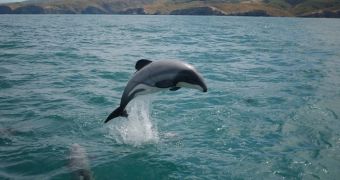It's the weekend, so chances are there are quite a lot of people in this world who are looking forward to going to the movies, taking a walk in the park or just sitting in front of the TV all day.
The bad news is that environmental group the World Wildlife Fund is ready and willing to rain on pretty much everybody's parade by giving people something other than blockbusters and barbecues to think about.
Long story short, the organization is now saying that, according to recent estimates, just 55 Maui's dolphins are currently left in the world, and that time is running out to keep these marine mammals from going extinct.
In fact, wildlife researchers estimate that, if this subspecies of Hector's dolphin is to even stand a chance at surviving on the long run, New Zealand cannot afford to lose more than one Maui's dolphin once every 10 to 23 years.
Should more such marine mammals die within said period of time, chances are that the Maui's dolphin population in New Zealand's waters will not be able to recover.
For those unaware, Maui's dolphins are a subspecies of Hector's dolphin. They only inhabit the waters off New Zealand's North Island west coast, and they usually hang out close to land, at depths of about 20 meters (65.6 feet).
The World Wildlife Fund explains that, for the time being, Maui's dolphins are among the world's rarest marine mammals, and argues that implementing measures intended to keep them from falling off the biodiversity map in the near future should be a no-brainer.
“We are down to the last 55 dolphins, so we are calling on our political leaders to let them know it’s time to take action to save these precious animals,” conservationist Chris Howe says in a statement.
“At the rate we are going the only place future generations will be able to see Maui’s is in museums,” the World Wildlife Fund New Zealand Executive Director goes on to argue.
The environmental group asks that the New Zealand government move to protect areas where Maui's dolphin sightings have been documented in the past, and fishing vessels operating in waters inhabited by such marine mammals quit using gear likely to harm them.
“WWF is calling for the New Zealand government to extend the ban on net and trawl fishing to cover the Maui’s entire territory and to work with fishing communities to save the Maui’s.”
“Support should also be provided to fishers to help them transition to dolphin-friendly practices. Fishing communities should not have to bear the cost of saving this precious dolphin alone,” the conservationists explain.

 14 DAY TRIAL //
14 DAY TRIAL //